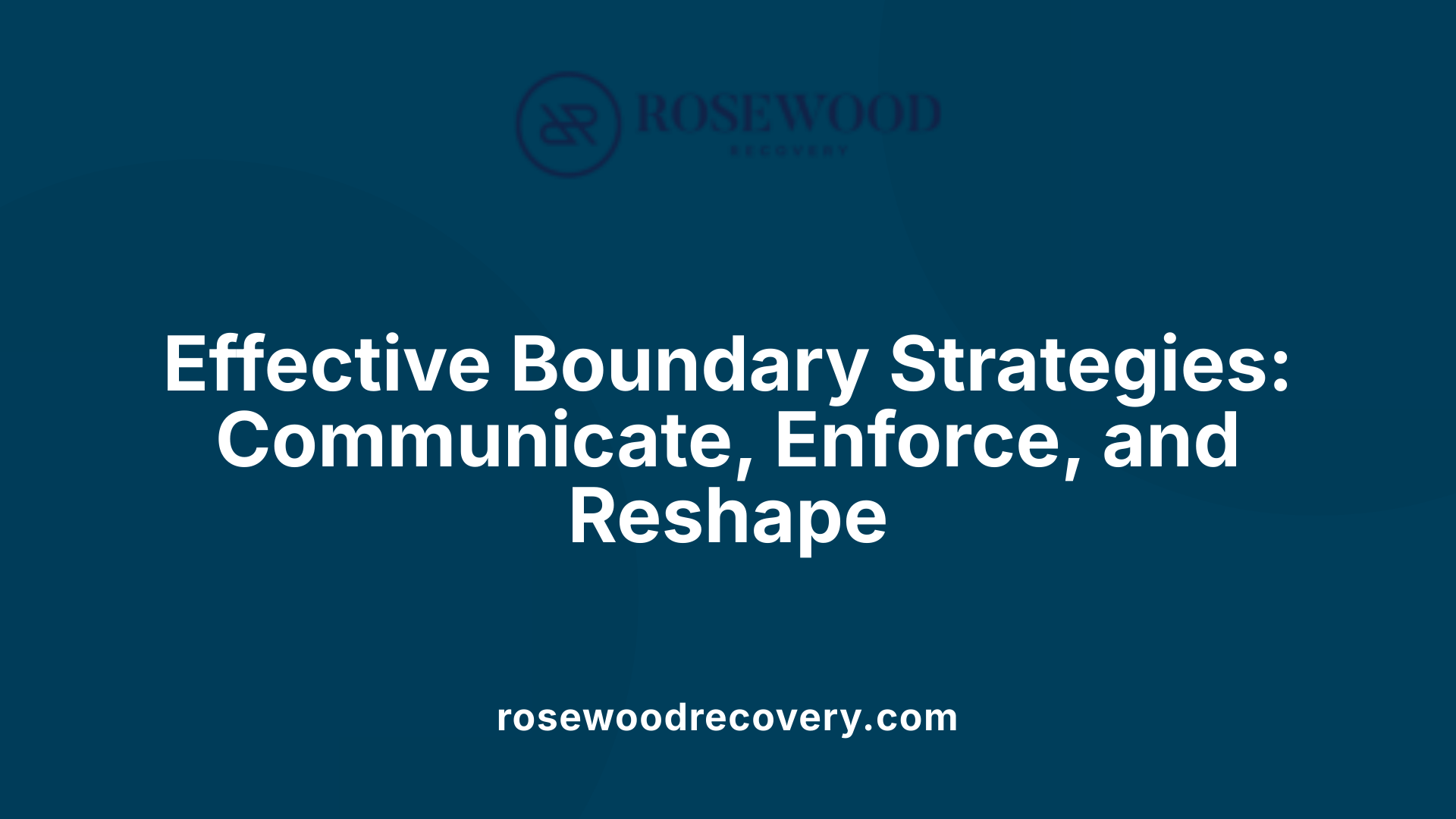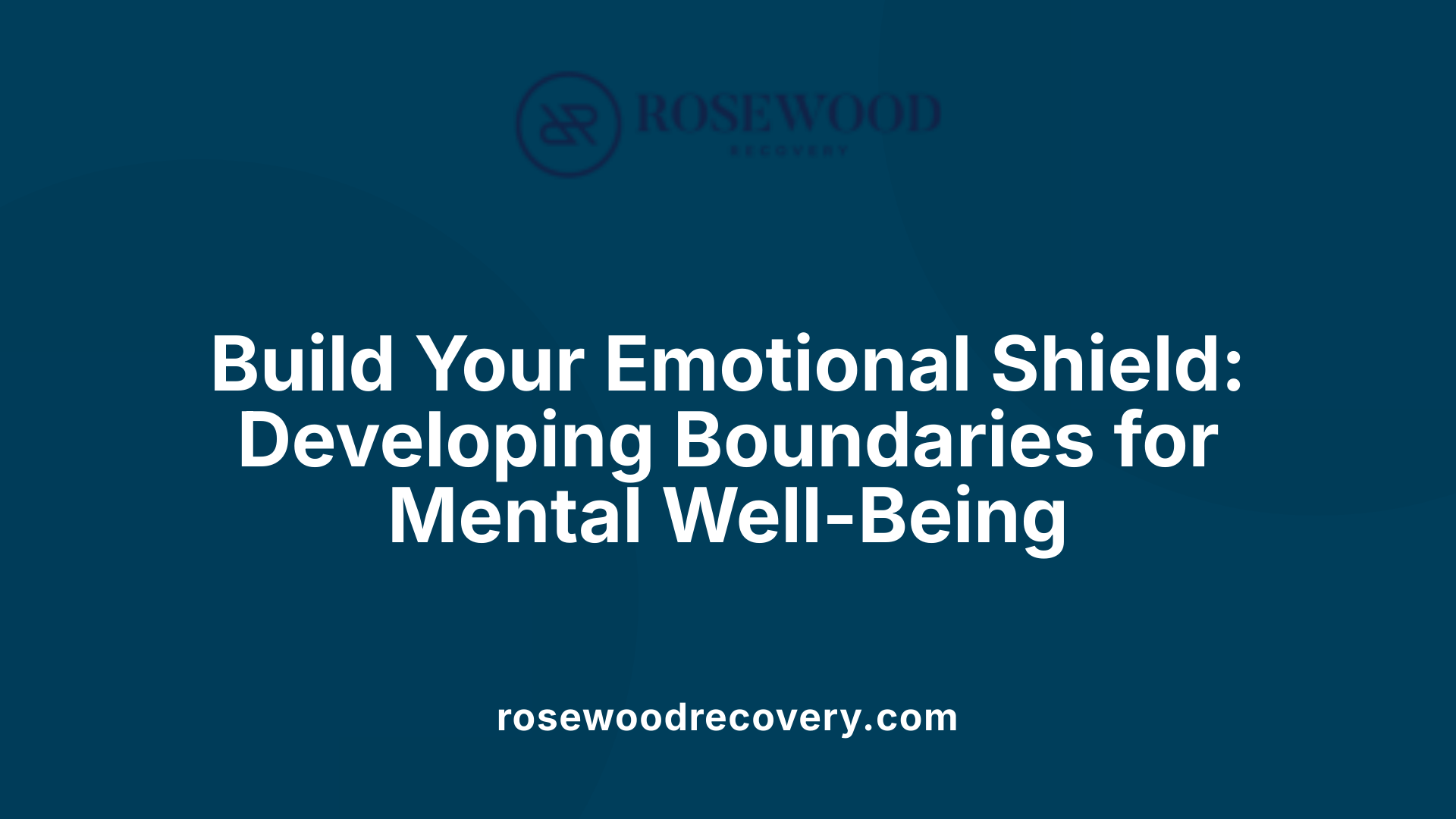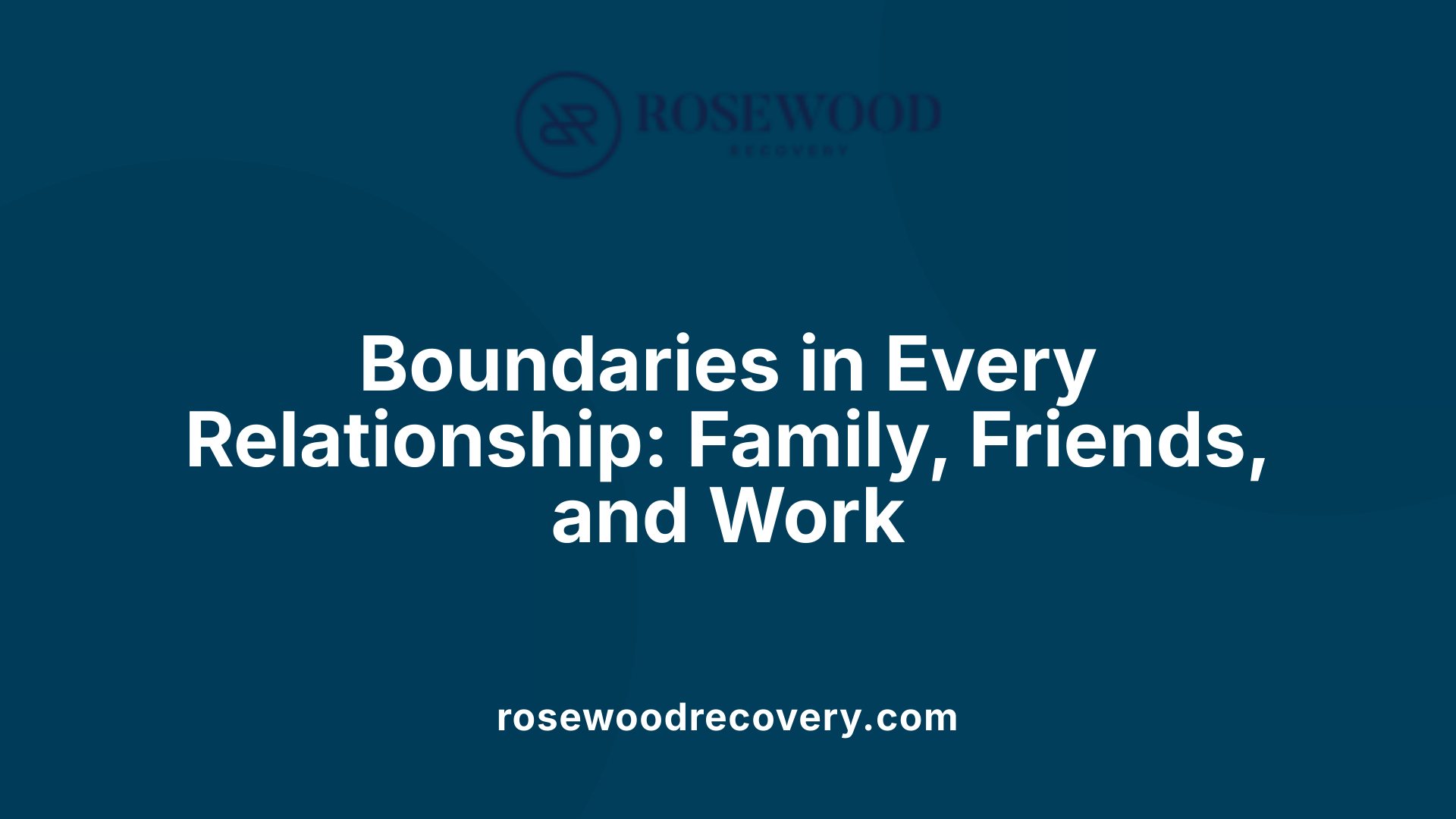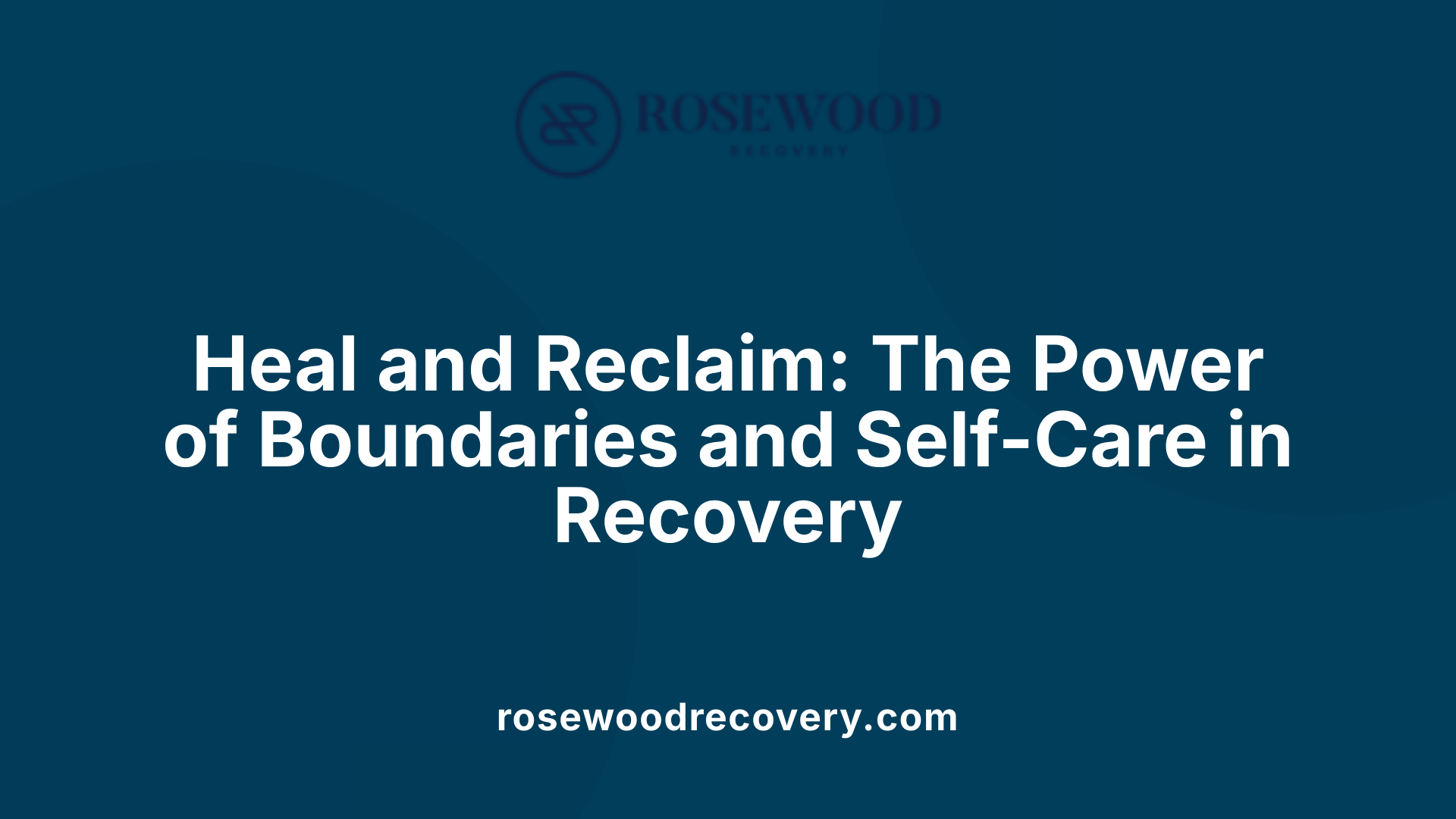Understanding the Need for Boundaries
Navigating toxic relationships demands self-awareness and firm boundaries to safeguard your emotional and mental health. Recognizing the importance of setting limits is the first step toward healthier interactions and personal resilience.
The Significance of Boundaries in Toxic Relationships
Why are boundaries important in toxic relationships?
Boundaries play a vital role in toxic relationships as a form of self-protection. They help individuals shield themselves from various forms of mistreatment, including manipulation, gaslighting, emotional abuse, and overreach.
In healthy relationships, boundaries are usually communicated with mutual respect and understanding, allowing both parties to feel safe and valued. However, in toxic dynamics, boundaries are often set rigidly to prevent further harm or exploitation. These boundaries define what behavior is acceptable and establish clear consequences when they are crossed.
Setting and enforcing boundaries in such situations safeguards emotional and mental well-being. They serve as a line of defense against ongoing harm, helping individuals maintain their dignity and control over their personal lives.
Understanding how to recognize boundary violations and the tactics used to pressure or manipulate can empower individuals. Whether it’s through cut-off, distancing, or clear communication, boundaries reinforce self-respect and are a crucial step toward safety.
Ultimately, establishing strong boundaries helps prevent further toxicity, fosters personal empowerment, and can lead to healthier interactions or, if necessary, the decision to leave harmful relationships. Recognizing the importance of these limits enables individuals to protect their well-being and restore balance in their lives.
Defining and Establishing Emotional Boundaries
What are emotional boundaries and how can I establish them in toxic relationships?
Emotional boundaries are personal limits set to protect your emotional well-being. They help define how others should treat you and how you respond to their actions. Setting these boundaries is essential, especially when dealing with toxic relationships that can drain your mental health.
To establish emotional boundaries, start by identifying behaviors that feel unacceptable or harmful. This might include dishonesty, manipulation, disrespect, or controlling actions. Once you know your limits, communicate them clearly and assertively using "I" statements. For example, you might say, "I feel upset when you dismiss my feelings," rather than blaming or criticizing.
Enforcement is crucial. Consistently uphold your boundaries by enforcing appropriate consequences when they are crossed. This could include limiting interactions or taking a break from the relationship if harmful behaviors continue.
Recognize that not everyone will respect your boundaries immediately, especially in toxic situations. Some individuals may not change despite your efforts. If the relationship remains harmful or overwhelming, prioritizing your mental health might mean walking away.
Remember, setting emotional boundaries is an act of self-care. They can be strengthened through regular practice, self-reflection, and support from trusted people or professional help. Upholding these limits not only protects your emotional state but also reinforces your sense of self-worth.
Recognizing Toxic Behaviors and Dynamics

How can I recognize toxic behaviors and dynamics in my relationships?
Recognizing toxic behaviors involves being attentive to specific signs that may indicate unhealthy interactions. Persistent criticism, manipulation, and gaslighting—where your perceptions are continuously questioned—are common red flags.
Feelings of emotional imbalance, such as chronic anxiety, fatigue, or undervaluation, often signal toxicity. Invasion of privacy, overstepping personal boundaries, and the presence of emotional or physical abuse also point toward unhealthy relationships.
Power dynamics play a significant role; if you notice that control and dominance are consistently exercised over your choices, or if your partner or friend expects obedience without regard for your feelings, these are warning signs.
It’s normal to experience some conflict, but ongoing distress or feelings of emotional safety being compromised are serious indicators. When relationships cause low self-esteem, anxiety, or depression over time, it’s vital to consider setting boundaries or seeking support.
Being mindful of these signs, practicing self-awareness, and knowing when to distance yourself can help protect your well-being. Recognizing toxicity early allows you to take steps toward healthier interactions and maintain your mental health.
| Signs of Toxicity | Manipulation Tactics | Power Dynamics | Emotional Impact |
|---|---|---|---|
| Constant criticism | Guilt trips | Authority exertion | Anxiety and fatigue |
| Gaslighting | Blame shifting | Control of decisions | Low self-esteem |
| Privacy invasion | Emotional blackmail | Demanding obedience | Depression |
| Physical or emotional abuse | Playing on insecurities | Disrespecting boundaries | Chronic stress |
| Overall imbalance | Coercion | Exploiting entitlement | Feeling overwhelmed |
Understanding and identifying these signs can help you decide whether to set firm boundaries, seek help, or leave the relationship. Protecting your mental and emotional health should always be a priority.
Strategies for Effective Boundary-Setting

What strategies can help in setting and maintaining emotional boundaries effectively?
Establishing and preserving healthy emotional boundaries is essential for emotional safety and maintaining respectful relationships. One effective approach begins with clarity and specificity. Clearly defining what behaviors are acceptable and what are not helps minimize misunderstandings. For instance, setting a rule like 'I do not share personal details with coworkers' creates a concrete standard.
Communication plays a crucial role. Express messages assertively and respectfully, using ‘I’ statements such as 'I feel overwhelmed when I receive work emails after hours.' This approach conveys your needs without blaming others. Being genuine and direct maintains trust and reduces the risk of misinterpretation.
Internal barriers like guilt, obligation, or a strong desire to help can make setting boundaries challenging. Recognizing these feelings allows you to work through them consciously. Techniques like journaling, talking with a therapist, or discussing your feelings with trusted friends can build resilience in boundary-setting.
Grounding techniques can also support you in maintaining boundaries during interactions. Visualizing an opaque bubble around yourself acts as a mental barrier, helping you stay calm and centered. When feeling overwhelmed, returning your focus inward reduces the influence of external pressures.
Prioritizing self-care is like putting on your own oxygen mask first. Ensuring you have time for rest, hobbies, and emotional check-ins reinforces your capacity to uphold boundaries. It’s important to remember that boundaries are not static; they evolve with your experiences and needs.
To keep boundaries effective, regular review and adjustments are necessary. Reflect on what’s working, what’s causing discomfort, and make changes accordingly. Communicating adjustments clearly ensures ongoing mutual respect.
Ultimately, maintaining healthy boundaries involves respecting your needs and those of others. When boundaries are firm yet compassionate, relationships tend to be healthier and more satisfying. Regularly practicing these strategies fosters emotional resilience and personal integrity in your interactions.
Developing Healthy Emotional Boundaries

How do I develop healthy emotional boundaries?
Building strong emotional boundaries is essential for protecting your mental health and maintaining respectful relationships. The foundation begins with self-awareness. Take time to understand your personal needs, emotional triggers, and limits. Recognize areas where your boundaries might be weak or unclear, especially with specific individuals.
Effective boundary-setting hinges on clear and honest communication. This involves expressing your feelings and needs directly, using assertive language that does not convey demands or guilt. For example, saying, "I need some alone time after work," is straightforward and respectful.
Practicing self-care reinforces your boundaries. Techniques such as grounding exercises or setting aside time for yourself help keep your emotional balance. Just like the instructions on an airplane to put on your oxygen mask first, prioritizing your well-being allows you to support others without sacrificing your own health.
Understanding that boundaries are flexible and influenced by cultural and personal factors is also important. Different relationships may require different limits, and respecting these differences can prevent resentment and emotional fatigue. Recognizing what is acceptable in each context helps you avoid feelings of guilt or obligation.
Facing barriers such as past trauma, ingrained beliefs, or fear of conflict can make boundary-setting challenging. Overcoming these obstacles may involve journaling, mindfulness, or seeking guidance from trusted friends or mental health professionals.
Consistent reflection on your boundaries, along with compassionate self-assessment, is vital. It allows you to adapt and strengthen your emotional limits over time. In turn, this leads to healthier relationships where your feelings are respected, and your well-being is maintained.
Boundaries Across Various Relationship Contexts

How do boundaries function across different types of relationship contexts?
Boundaries play a crucial role in all human interactions by setting limits that foster respect, safety, and trust. In personal relationships like friendships and romantic partnerships, boundaries help individuals articulate their emotional and physical needs. For instance, someone might specify what personal topics they are comfortable discussing or set limits on physical contact to feel safe.
In romantic relationships, boundaries are especially important to maintain individual identity while fostering closeness. Clear boundaries about time, emotional availability, and intimacy create a balanced connection and prevent feelings of resentment.
In professional settings, boundaries ensure ethical standards and responsibilities are clear. They help define work hours, acceptable communication channels, and limit personal disclosures that could blur the lines between work and personal life. For example, setting boundaries about responding to work emails outside of office hours helps protect personal time and mental health.
Cultural and individual differences significantly shape how boundaries are understood and communicated. Some cultures emphasize collective well-being over individual boundaries, influencing how rules are set and enforced. Effective boundary-setting requires self-awareness and good communication skills to navigate these variations.
Ultimately, boundaries serve the essential function of balancing connection and individuality. They help prevent toxicity, reduce misunderstandings, and can adapt as relationships evolve or circumstances change. Whether in family, friendship, or work contexts, boundaries safeguard well-being and promote healthy interactions.
Healing Through Boundary-Setting and Self-Care

How can setting boundaries aid in healing and coping from toxic relationships?
Establishing boundaries is essential for healing after experiencing toxicity in relationships. When boundaries are in place, they serve as a protective barrier that shields your emotional and mental well-being. This act of setting limits allows you to regain control over your life and reinforces your sense of self-respect.
Healthy boundaries help clarify what behaviors are acceptable and what are not, reducing feelings of overwhelm and emotional drain. For example, deciding not to answer work emails during personal time or refusing to accept disrespectful behavior are ways to uphold your dignity and reinforce your worth.
Regularly reviewing and adjusting boundaries is important because circumstances and emotional needs can change. Reinforcing boundaries prevents resentment and burnout, making sure they remain effective.
Creating a safe environment through boundaries also involves understanding your triggers and personal limits, which helps avoid repeating harmful patterns.
This ongoing process of boundary-setting not only fosters a sense of autonomy but also helps in coping with the residual effects of toxic relationships. It provides a framework for recovery by empowering individuals to prioritize their well-being, ultimately supporting long-term emotional and mental healing.
In summary, boundary-setting acts as a foundation for recovering from toxicity, promoting resilience, safety, and self-empowerment.
Empowering Yourself Through Boundaries
Establishing and enforcing healthy emotional boundaries is an act of self-care and resilience, especially in toxic relationships. It involves understanding your needs, communicating assertively, and remaining consistent in protecting your well-being. Recognizing toxic behaviors and dynamics enables you to respond effectively, whether by setting firm limits or choosing to leave harmful situations. As you develop these boundaries, you'll foster healthier interactions, regain control over your emotional landscape, and build greater confidence to navigate future relationships with clarity and strength. Ultimately, boundary-setting is a vital step toward attaining peace, safety, and authenticity in all aspects of your life.
References
- Seven Tips for Setting Boundaries in Unhealthy ...
- This boundary advice is secretly destroying your ...
- Is It Possible to Set Boundaries with Toxic People?
- Goodbye Toxic Relationships: Hello to Healthy Boundaries
- Setting Boundaries with Toxic People: 10 Essential Strategies
- How to Set Healthy Boundaries & Build ...
- A Guide for Setting Boundaries in Relationships

.jpeg)
.jpeg)

